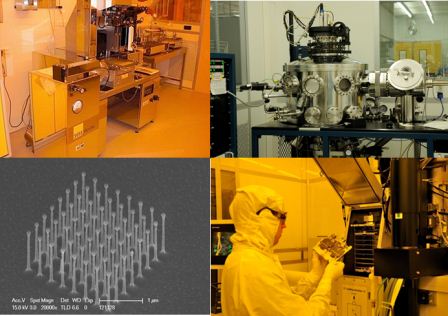Students & education
Kavli Nanolab group
The Kavli Nanolab is the central research laboratory of the Kavli Institute of Nanoscience (Quantum Nanoscience and Bionanoscience) for the fabrication of nanostructures and devices. Its main clean room is housed in the Van Leeuwenhoek Laboratory, one of the largest clean room labs in Europe.
In this lab, researchers –students to senior– make their devices in which they e.g. study the electronic, optical, (quantum-)mechanical, or magnetic properties or use them as artificial environments of biological cells and molecules.
Engineering on the nano-scale is based on techniques like nanolithography, thin film deposition, plasma processing, and inspection. The field combines physics, materials science, chemistry, biology, and instrumentation. The multidisciplinary field is highly experimental and is continuously growing.
The Kavli Nanolab group participates in technology development with many internal and external partners. In the newest developments, there is ample room for MSc and BSc student research projects. Currently our focus is on ultrahigh resolution nanofabrication with electron and focused ion beams.

Upper left: nano-imprint tool, that presses a nanostructure into a thin film. Upper right: deposition system, films are grown atomic layer by atomic layer. Lower left: example of a fabricated device. Lower right: student loading a sample in the electron beam pattern generator.
By doing your bachelors (or masters) project in the Kavli Nanolab Group you get to understand and develop (new) nanofabrication techniques. You'll really work at the edge of what is currently known and do a project that will give new insights into the physical workings of these techniques. You'll also get to work with the staff that maintains and supervises the use of the clean-room facility. These people are very experienced with the specific processes and the equipment they maintain and are willing to assist and help you to get to know that as well. You'll also be able to independently work on your project; if you have questions or need help the scientific staff, the PhD student(s), or someone else of the staff is always more than willing to answer them or point you in the right direction to find the solutions. Most times the group eats lunch together, which is a great time to get to know them better and have some great conversations.